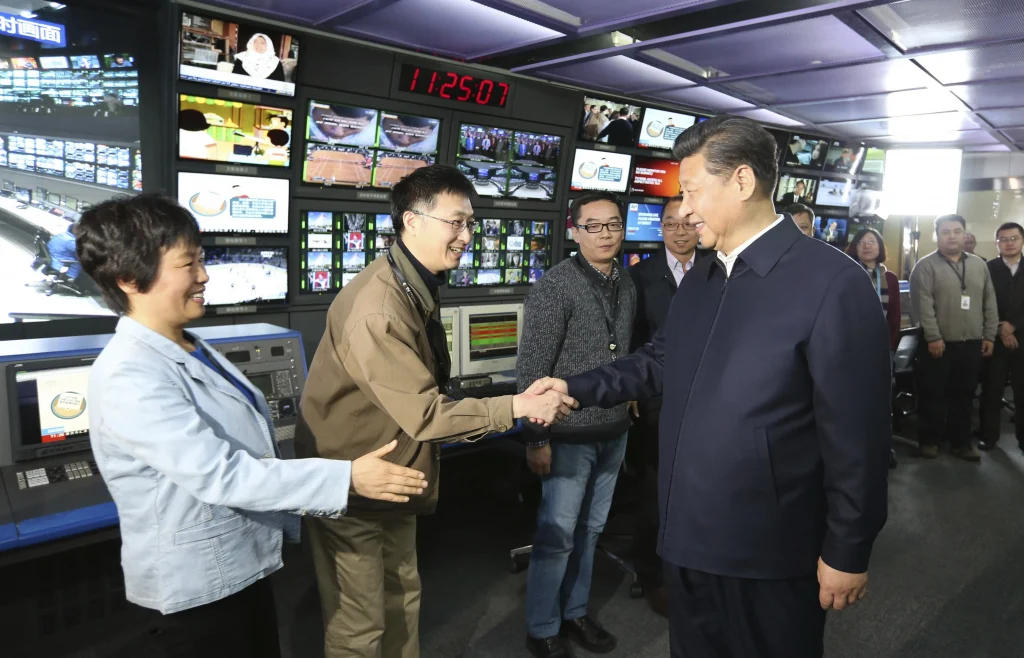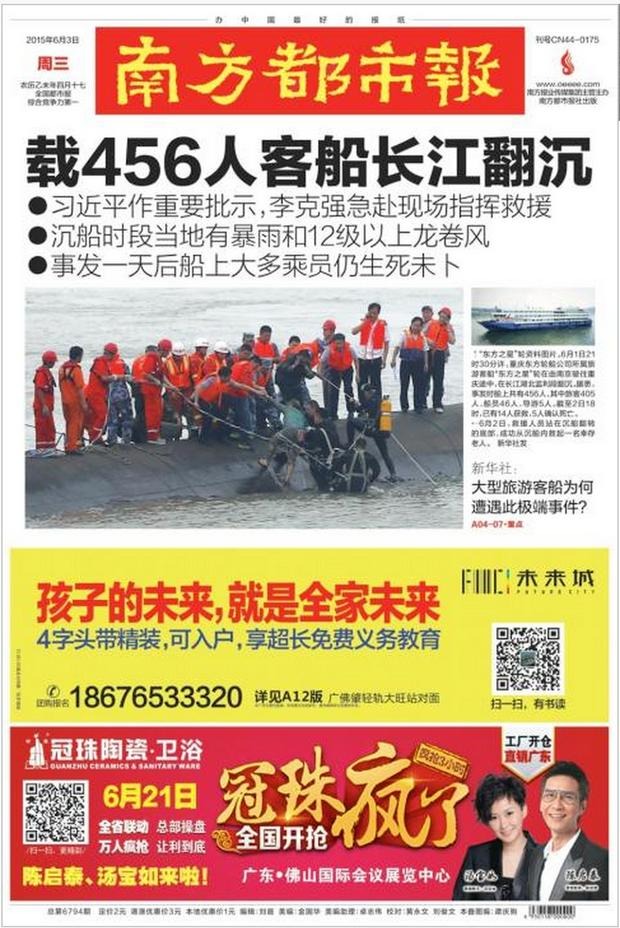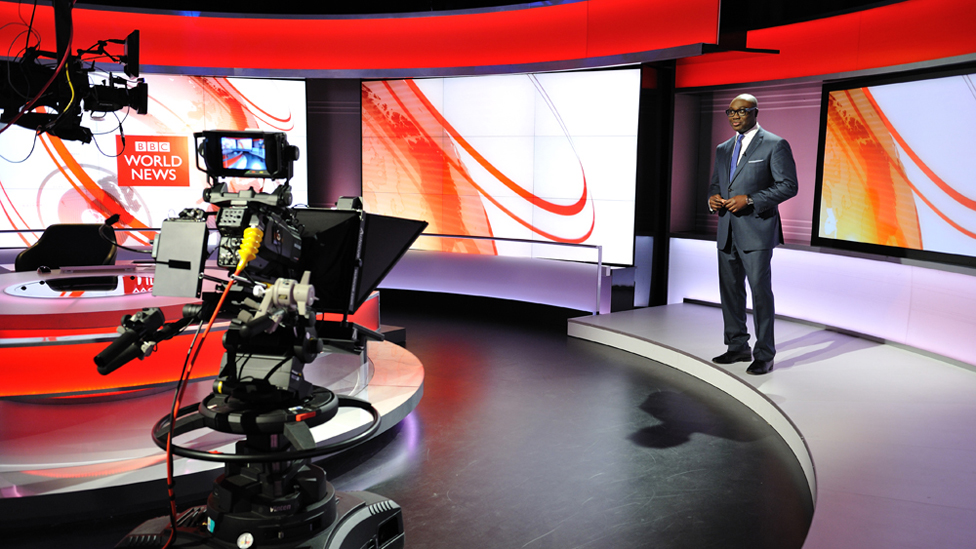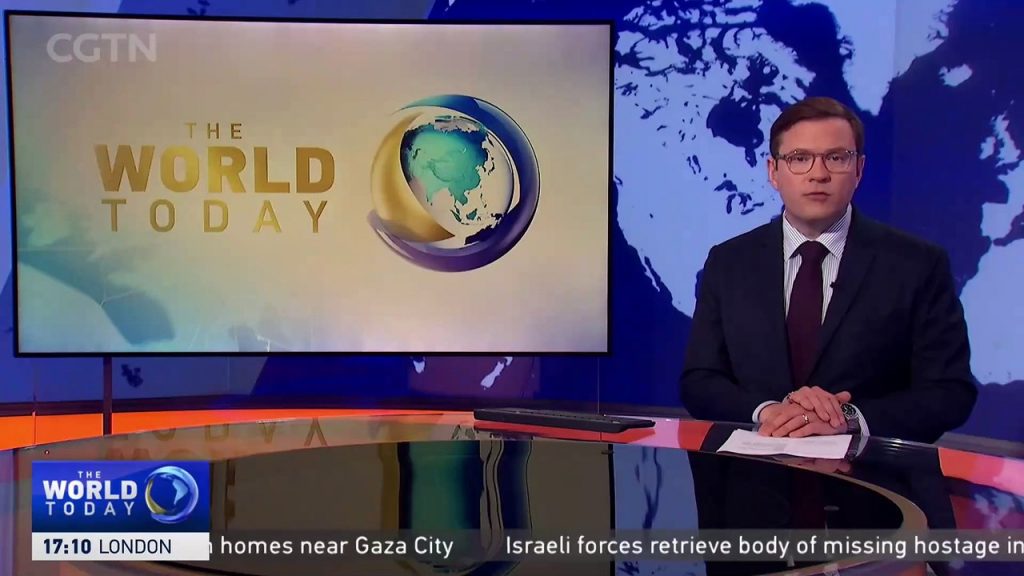Small Acts of Journalism

Ryan Ho Kilpatrick

Vivien Marsh
China Central Television, or CCTV (央視), is often likened to “the BBC of China.” But the comparison is a very imperfect one. While both take public funding, one has its editorial independence guaranteed by a royal charter, while the other is an unabashed mouthpiece for the ruling Communist Party. Day to day, both are motivated by different answers to the question of what journalism ought to be: is it holding power to account, or serving power?
For all its imperfections, however, Vivien Marsh teases interesting observations from this comparison. In her book Seeking Truth in International TV News China, CGTN and the BBC, Marsh draws on three decades of experience as a BBC global news editor, reporter and writer, to think about what makes China’s English-language, international-facing news coverage different — and what that says about the political system it serves.
To learn more about what sets these two worlds apart, where they’re drawing closer, and where they’re drifting further apart, CMP Managing Editor Ryan Ho Kilpatrick asked Vivien Marsh about what she found out.
Ryan Ho Kilpatrick: You’ve written about how the way CCTV-News and CGTN news are organized and presented is totally different from what Western viewers would expect of the news. Can you give some examples of this?
Vivien Marsh: It comes down to the different conceptions of the role of journalism in Western and particularly Anglo-American societies when compared with the Chinese state. It’s the difference between holding elected (and other) power to account, and acting as an arm of the state or — if viewed more charitably — an interface between the leadership and the people.

It’s not a specifically Chinese thing to attempt to appropriate the power and reach of national news broadcasters; in Britain, politicians talk of the cultural soft power of the BBC World Service, for example. However, China’s expansion of its foreign-language international media was intended specifically to use them to improve its “discourse power” on the world stage.
In 2003, Beijing’s propaganda chief even spoke of turning CCTV’s English-language news into “a Chinese CNN” on the assumption that CNN was a propaganda tool of the US government. Such an approach involves the imposition of editorial “red lines” that jar not only with Western viewers but also with many Chinese journalists I interviewed. One CCTV-News producer told me that they reluctantly took the decision to lead their program with a routine visit by Xi Jinping outside Beijing rather than the breaking news of the beheading of a hostage by the Islamic State group because they knew that, if they led with the hostage, the lead would be switched by CCTV’s political editors in any case.

When in my book I contrasted the reporting of the 2015 Yangtze River capsizing by the BBC and CCTV-News, I found that BBC journalists focused on the human cost of the disaster and the search to find the cause of the sinking, while CCTV-News spent much time on the heroics of the rescue operation in order to justify the decisions of the state. Interestingly in 2019, CGTN journalists were able to report more freely on the impact of a chemical explosion in Yancheng in Jiangsu and the safety concerns that preceded it. However, I observed that the trajectory of imputed blame stopped at or before the provincial level, which appeared to be deemed “fair game” for reporters as it was not a threat to Beijing.
RHK: How successful has CCTV’s international arm, CGTN, been in imitating what you call the “televisual grammar of the West?”
VM: This is one area in which CGTN has made great strides. The product looks much slicker than did that of CCTV-News when I first started studying China’s anglophone television in 2013. Ways of storytelling that are familiar to Western viewers, such as the choice of strong pictures or the foregrounding of the reporter with a walk-and-talk or piece to camera, gradually found their way into China’s English-language TV news output.
In my PhD thesis, I conducted a visual comparison of the opening sequences of the news bulletins of BBC World News, CCTV-News, and CCTV’s flagship daily Chinese news program Xinwen Lianbo. The BBC and CCTV-News were very similar pictorially with their focus on impactful headlines of world events, whereas Xinwen Lianbo emphasized the primacy of the two newsreaders with no visual distraction. CGTN’s Chinese reporters are also much more fluent in English than most of their predecessors at CCTV-News, which gives them the confidence to conduct live two-ways, or “crosses,” with the studio while on location.

For a journalistic culture that regards reporters as the lowest element of the food chain, the editorial elevation of the individual has been a significant change. But as one of CCTV’s journalists told me during my research, the objective was to “learn from the West [and] use their way to report stories so [Western viewers] accept China’s image.” Many of my Chinese interviewees from CCTV-News and CGTN talked of their aspirations to journalistic professionalism. This appeared to refer to clarity and technically proficient presentation rather than editorial attributes such as due impartiality or balance.
Many of my Chinese interviewees talked of their aspirations to journalistic professionalism [but] this appeared to refer to clarity and technically proficient presentation rather than editorial attributes such as due impartiality or balance.
RHK: China’s understanding of soft power is, you note, different from how it was conceptualized by Joseph Nye. What makes it distinct and has deviating from things traditionally thought of as soft power like culture and history been an effective strategy for them?
VM: CCTV-News, the forerunner of CGTN, was given funding to expand during the Hu Jintao era, and its output frequently featured soft power vehicles such as calligraphy and Chinese-language learning. This was in line, superficially at least, with Nye’s conception of achieving national aims through attraction rather than coercion. Hu himself spoke in 2007 of the importance of enhancing cultural soft power.
However, Chinese scholars had long viewed China’s soft power as having a more robust edge, involving its technological and economic prowess along with a pragmatic foreign policy. This has been reflected in the news programs of CCTV-News and CGTN, in that they have foregrounded Chinese innovation, China’s economic rise, overseas investment, and participation in multinational peacekeeping or medical initiatives. There is nothing particularly Chinese about this approach; everything comes from somewhere, and every organization that deals with news will deliver a view of what it deems to be important from its vantage-point on the world.
Whether CNN intended it or not, for example, it conveyed the full impact of the United States’ global dominance to international viewers when it showed cruise missiles hitting Baghdad in its live coverage of the 1991 Gulf War. Where Beijing’s perspective on soft power differs from that of other countries appears to lie in the increased prominence in its foreign-language media of China’s ideological positions. Even in Nye’s narrower conception, soft power can be derived from the attractiveness of a nation’s values – and under Xi Jinping, the values of the Chinese state are increasingly being publicized as alternatives to Western perspectives. This is part of the discourse power that China has striven for over the past twenty years.
However, the mere transmission of a national viewpoint through international media does not guarantee that it will be received sympathetically. Simply explaining Beijing’s position on what it calls “vocational education and training” centers for Muslim minority citizens in Xinjiang does not airbrush Western reports of mass internment out of existence. Didacticism in news programs does not sit well with the notion of winning over foreign hearts and minds.
Didacticism in news programs does not sit well with the notion of winning over foreign hearts and minds.
RHK: In Taiwan, we’ve noticed a trend in PRC propaganda away from positive stories about China — which are regarded with a high degree of suspicion — and toward stories undermining confidence in Taiwan’s democracy and its allies, particularly the United States. Have you noticed this elsewhere as well?
VM: This has been a feature of CGTN’s news output in recent years, particularly, as you say, with regard to the United States. I analyzed a cross-section of CGTN news output in 2023 and found a preponderance of news items on US shootings, US police violence, and perceived US economic instability. The treatment of these stories was journalistically even-handed although the topics themselves appeared to have been selected for the negative light in which they showed the United States. I’ve also noticed negative reporting on Britain and other European countries by CGTN from time to time — the rise of the far right, the Brexit debacle, and so on.
It isn’t always easy to determine when negative coverage becomes an agenda. Topics such as US gun laws and Brexit should be covered thoroughly by the media of the countries concerned in any case. If they aren’t — and they sometimes aren’t, particularly in the case of Brexit — then factually accurate alternative coverage should be welcome. Of course, China itself has long accused Western news outlets of negative coverage. Constrained budgets at Western news organizations since the 2008 global financial crisis, along with Beijing’s increasing restrictions on foreign journalists, have certainly made it difficult for Western media to cover a broad range of China topics. Only the most newsworthy or, let’s face it, most straightforward stories tend to be treated — and if these involve the coronavirus, Xinjiang, or the South China Sea, it’s easy to perceive this as intentional negativity.
For its part, CGTN does not appear to suffer from undue constraints on the scope of its commissioning where the United States and Western Europe are concerned, although its African news seems to have taken a budgetary hit in recent years.
RHK: On a similar note, we’re also working on a piece right now about the strange allies Chinese state media have made among fringe, extremist Western influencers. It often feels like they have given up on winning hearts and minds among the general public in their target countries and helping audiences there to better understand China, and are now purely concerned with winning “discourse power” and using it unapologetically. Is this something you’ve observed as well?
VM: This switch in approach became very evident after the re-brand of CCTV-News as CGTN on the last day of 2016. Interestingly, this re-brand erased the word “news” from all programming; the N in CGTN stands for Network, and its programs News Hour and News Update were replaced by Global Watch and The World Today, respectively.

Where CCTV-News minimized the importance of negative China news in its output or ignored it altogether, CGTN has consistently sought to proclaim the Chinese state’s version of events in China and denigrate Western journalism in the process. This was most noticeable when reports emerged of detention camps in Xinjiang. After a flurry of damaging Western news features about the camps, CGTN sent one of its most fluent and confident Chinese presenter-reporters to the far western region to “tell China’s story well” — to use Xi Jinping’s words — and to sow doubt about Western narratives.
CGTN also used its YouTube channel for pithy explainer-like videos that tackled Western accusations head-on, such as a video entitled “Are Uygurs being tortured in China?” The channel’s reporting made plenty of pro-China assertions but did not engage directly with the substance of the Western reports, with the exception of one case I studied in which it misrepresented the facts. Subsequently, when the Western world was searching for the source of the coronavirus pandemic, CGTN used its social media accounts to discredit Western reporting, point out a lack of US leadership in the crisis, and praise Beijing’s response.
CGTN has certainly been moving closer to RT of Russia in promoting an alternative worldview through undermining trust in news media in general, and this must be uncomfortable for the many foreign journalists who joined CGTN to do what they consider a professional job. There is certainly space for different perspectives on news around the world, but disinformation benefits no one and will not enhance any country’s discourse power, no matter how loudly it shouts.
CGTN has certainly been moving closer to RT of Russia in promoting an alternative worldview through undermining trust in news media in general.
RHK: Finally, I enjoyed your coin of phrase “small acts of journalism,” which reminded me of my interview with Emily Chua and her concept of “the ethics of efficacy.” Can you unpack what you mean by this and give some examples you’ve noticed?
VM: The phrase “small acts of journalism” is a nod to the book Small Acts of Resistance, which chronicles the microscopic ways in which citizens have, over the years, demonstrated their opposition to authoritarian rule. “Small acts of journalism” represent, in my view, the unspoken ways in which journalists at CCTV-News and — very occasionally — CGTN have gotten round excessive editorial controls to produce a more comprehensive journalistic job.
As you note, Emily Chua’s interview is very relevant here in that she talks about how Chinese journalists have to navigate and manage a whole network of relationships and situations. My “small acts of journalism” relate in particular to state media’s China news rather than news about other countries. As I discuss in my book, political control of China news tends to be far stricter. Additionally, control is more often exercised in the early stages of a news story. During the 2014 Umbrella Movement protests in Hong Kong, for instance, CCTV-News journalists went from not being able to talk about the protests at all to, eventually, interviewing anti-government protesters. This was once it became clear to Beijing that the protests did not represent an existential threat.
Examples of “small acts of journalism” that I have unearthed include the continued presence of the CCTV-News ticker across the bottom of the TV screen giving details of the 2014 Kunming railway station stabbings, even though the news story itself had been withdrawn for several hours. It may have been the management’s decision to hold off the story until further political guidance was received, but presumably, no one had issued specific instructions to remove the news ticker.
A more striking example of a “small act of journalism” was a CCTV-News report from Shanghai shortly after the 2015 Yangtze cruiser sinking, in which some distraught relatives of the missing were seen falling to their knees and sobbing while others besieged the offices of the shipping company demanding information. The report was not shown again, and subsequent news items performed an editorial pivot to concentrate on more positive or hopeful elements of the rescue and retrieval operation. It was noticeable that the images in the Shanghai report were far stronger than suggested by the script. CCTV-News political editors were supposed to view pictures as well as words but it is not known if they always do so.
Finally, it could be seen that the more experienced Chinese journalists at CCTV-News — and to a much lesser extent CGTN — were able to broach sensitive subjects through a delicate dance along the red lines of what was deemed politically acceptable, where newer recruits are not able to tread. My content analysis uncovered CCTV-News features about China’s ghost cities and about belated justice for the relatives of a man who was wrongly convicted and executed. Such journalists no longer have such a high profile at CGTN, and the emphasis on “telling China’s story well” overshadows the undoubted instances of balanced reporting on the channel.

Ryan Ho Kilpatrick








